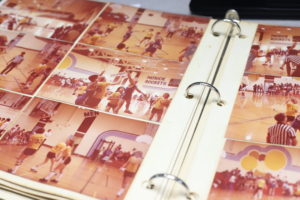
Playing defense, the Achievers got a run for their money by an opposing team. However, they prevailed!
While searching through the storage spaces at Brevard Achievement Center’s (BAC) Rockledge location, our staff came upon some treasure. Hidden on a high shelf, covered in dust were scrapbooks from BAC past. Naturally, we cleaned them up and began to reminisce.
Flipping through the pages revealed a number of familiar faces and celebrations. Smiles raced across the snapshots from a staff and client camping trip in 1984. Dancers at a holiday party froze in time from an album dated 1980. All showed how BAC was alive and thriving as strongly as it is today. Respectively, one album stood out in particular.
Focusing on the 1979-80 Special Olympics was an entire scrapbook dedicated to BAC’s home team, the Achievers. Wearing matching yellow uniforms and striped tube socks, the Achievers showed face at the Winter and Summer games. This group of individuals represented our organization proudly by achieving their own personal success. The proceeding pages highlighted their competition in events like basketball, track and field, and tennis. Medallions even graced the necks of some of the boys and girls representing a winning title. The Achievers were a force to reckon with! They made BAC proud by their accomplishments, but more importantly, by having fun.
The Beginning of a Legacy
The Special Olympics is a yearly sporting event that gives opportunities for persons with disabilities to partake in athletic activities. Cross country skiing, gymnastics, swimming, and judo are just some of the sporting events that are featured in the Special Olympics. Today, thousands of people with varying intellectual disabilities from all over compete in national and global Olympic games. But how did this all begin?
We can first thank Eunice Kennedy Shriver. In the late 1950s, Shriver decided to make a change for the community. She saw how unfairly and unjust people treated those with intellectual disabilities. As a result, Shriver created a backyard-summer camp for youth with intellectual disabilities. Shriver’s goal was to learn what these children could do in sports – not what they could not. Throughout the 1960s she continued spreading her awareness. For that reason, the first international Special Olympics Games was held at Soldier Field in Chicago in 1968. Her gracious effort is why people like our friends at Brevard Achievement Center (BAC) are able to compete in a nondiscriminatory environment.
This past summer was the fiftieth-anniversary of the Special Olympics USA Games. People from all over flew into Seattle for a six day journey to gold. More than 4,000 coaches and athletes represented the fifty states and tens of thousands of volunteers and fans watched on. Thank you, Eunice Kennedy Shriver. It takes one person to make a change that lasts a million lifetimes.
To learn more about our local Special Olympics hub, visit SpecialOlympicsFlorida.org.
